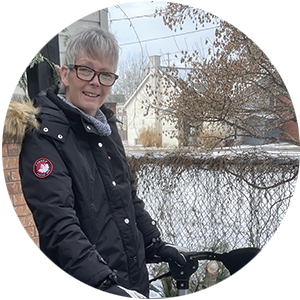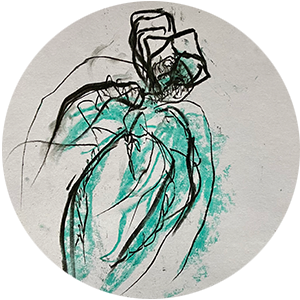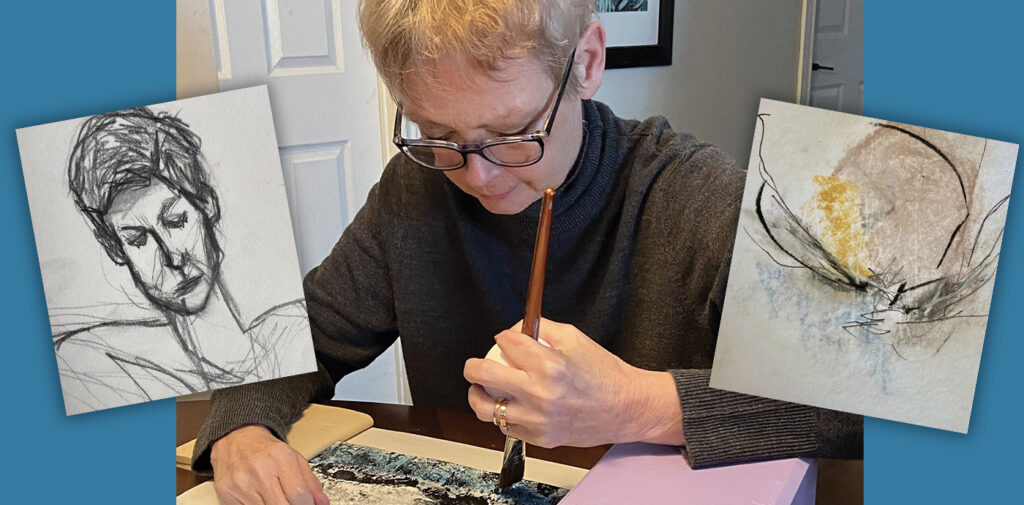She got her own studio where she practiced every medium of art, with the exception of clay, and even taught classes. Today, she is a 65-year-old mother, wife and grandma who loves the arts, her family and nature. Her happiest times are spent creating and being with her family.
Wendy and her husband moved to Orillia just before COVID – not long afterward, the lockdown was in full force, and the couple didn’t have a chance to meet many people in their new neighbourhood. “I made a studio in my basement and started making art again,” says Wendy. By July 2021, she was in a deep creative state, creating like never before. Then everything changed.
“We went to a friend’s cottage for the long weekend like we do every summer,” Wendy shares, “We had a lovely evening of dancing and I felt dizzy suddenly. It felt like a migraine was coming. I went to bed that night and woke up paralyzed. The ambulance took me away, and they thought I was having a stroke at first. But the MRI showed that I had damaged my spine – I had undiagnosed degenerative disc disorder.”
“Everyone knew I was an artist, so the ultimate goal was to get me to use my hands. We worked on it. They recognized my determination and optimism. ”
Wendy describes the terrible nerve pain she had. “Not only was I now paralyzed, but on the surface, it was like a burning sensation,” she says. Following surgery, where Wendy had two discs removed, the surgeon told her husband she had less than a five percent chance of regaining mobility. “I was an inpatient at Lyndhurst for three months, and the care was phenomenal. It makes me cry to think about it because you’re in this bubble of others who are going through similar things. It’s the emotional and mental care aspect, too – even when you don’t know what your needs are,” she shares. “My therapist said, ‘We’re going to tell your brain that you can walk.”
With support from her husband, who drove from Orillia daily to be with her, she started delving into her intensive rehabilitation routine. “Everyone knew I was an artist, so the ultimate goal was to get me to use my hands. We worked on it. They recognized my determination and optimism. I wanted the person I was to become friends with the person I’ve become. It was life-altering, but I wanted to keep going,” says Wendy.
In the winter of 2022, Wendy tried drawing but kept having hand spasms. “I thought I’m an abstract artist anyway, so it didn’t look too bad, and I incorporated poems and words into the drawings,” she says. With tons of encouragement from the art community and peers, people noticed that Wendy’s art was still distinctively hers. “It was my work. It had changed, but it was still distinctly me.”
Since then, she has participated in several art shows, and her passion for creating has been reignited. “I am a person and an artist, and I have a disability. That’s who I am. And I really appreciate SCIO because they hold space for us. They recognize the value in our lives and help us see it is not diminished.”
“Even though my injury was during COVID and I didn’t get to meet people in person, it was still helpful connecting virtually and much
less lonely. ”
Wendy wants to be a role model for her children and grandkids and show them that it’s not over until it’s over. “I want to show that there is a place for us. It’s hard, and it does come with things like chronic pain. But we can still be who we are, and I want people with disabilities to be seen. In whatever way we do it.”
A drawing Wendy completed after her SCI entitled “Once I was, now I am” was recently displayed at a gallery in Toronto. It had special meaning for Wendy as it represented her journey with art through her transition to living with a disability.
When Wendy is not creating new art, she connects with others with an SCI and participates in workshops to learn more about maximizing her life. “I went to the cannabis and SCI workshop recently because I’m still learning. I want to try everything, and I’m willing,” she says.
She also shares the importance of peer support. “Even though my injury was during COVID and I didn’t get to meet people in person, it was still helpful connecting virtually and much less lonely. You have to find a way to let people know you’re suffering and hear from others who have already been through it,” says Wendy.
Wendy hopes to continue exploring her art and tackling new challenges daily. “I can’t not be an artist,” she smiles, “It’s who I am.”




